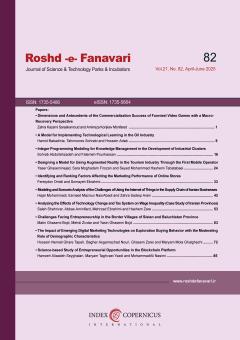Integer programming modeling for knowledge management in the development of industrial clusters
Subject Areas : مديريت دانش
sohrab abdolahzadeh
1
*
![]() ,
Fatemeh Pour Hassan
2
,
Fatemeh Pour Hassan
2
![]()
1 - Industrial Technologies Dept., Urmia University of Technology, Iran.
2 - Industrial Engineering UUT
Keywords: Group knowledge, Knowledge management, Industrial clusters, Innovative performance, Productivity,
Abstract :
In the current research, the mathematical model of Integer Programming for Knowledge Management in the development of industrial clusters is presented. Each cluster consists of a number of members and there are specialized portfolios and programs to improve knowledge. The specialized portfolios and knowledge promotion programs, the cost of implementing the programs jointly and separately, and the extent of their impact on all types of knowledge and at each skill level, are known. The proposed model selects the programs that have the greatest impact on knowledge, from every specialized portfolio, according to the budget limit. In order to validate, the proposed mathematical model was used for ten companies with five specialized portfolios and 13 programs. The programs promote six types of knowledge of cluster members' employees in three skill levels: low, medium and high. Mathematical model of integer programming was coded and solved with Gems software and the programs of product design workshop, business management training course, participation in domestic exhibition, industrial tour to visit foreign industries and foreign exhibition tour were selected. The impact of the programs on the knowledge of the cluster and the ratio of knowledge improvement to implementation cost were calculated. Based on the obtained results, the proposed mathematical model has a good efficiency in creating alignment and improving knowledge among members with a cluster approach, and if the programs are implemented jointly, the cost of improving knowledge will be significantly reduced.
جعفرنژاد، احمد؛ مومنی، منصور؛ مروتی شریف آبادی، علی و کریمی زارچی، محمد (1399). طراحی مدل توسعه پایدار خوشه های صنعتی. فصلنامه علوم و تکنولوژی محیط زیست, 22(3), 193–203.
[2] دانش شکیب، معصومه (1397). ارائه مدل پویای توسعه سرمایهگذاری و بهبود مزیت رقابتی خوشههای صنعتی ایران. نشریه علمی پژوهشی مدیریت کسب و کارهای بین المللی, 1(2), 111–134.
[3] A. Amin and N. Thrift, “Institutional issues for the European regions: from markets and plans to socioeconomics and powers of association,” in The New Industrial Geography, Routledge, 2002, pp. 292–314.
[4] N. Wickramasinghe, A. Fadlalla, and E. Geisler, “Knowledge management and data mining: Strategic imperatives for healthcare,” 2003.
[5] D. J. Teece, “Strategies for Managing Knowledge Assets: The role of firm structure and industrial context (in: Managing Industrial Knowledge,” Creation, transfer and utilization. London. Sage Publications, pp. 125–144, 2001.
[6] C.-C. Huang, “Knowledge sharing and group cohesiveness on performance: An empirical study of technology R&D teams in Taiwan,” Technovation, vol. 29, no. 11, pp. 786–797, 2009.
[7] A. T. Arikan, “Interfirm knowledge exchanges and the knowledge creation capability of clusters,” Acad. Manag. Rev., vol. 34, no. 4, pp. 658–676, 2009.
[8] A. De Bem Machado, S. Secinaro, D. Calandra, and F. Lanzalonga, “Knowledge management and digital transformation for Industry 4.0: A structured literature review,” Knowl. Manag. Res. Pract., vol. 20, no. 2, pp. 320–338, 2022.
[9] S. Breschi and F. Malerba, “The geography of innovation and economic clustering: some introductory notes,” Ind. Corp. Chang., vol. 10, no. 4, pp. 817–833, 2001.
[10] C. Casanueva, I. Castro, and J. L. Galán, “Informational networks and innovation in mature industrial clusters,” J. Bus. Res., vol. 66, no. 5, pp. 603–613, 2013.
[11] J. Xiong, Z. Duan, and Y. Wang, “Modeling and simulation of the inter-organizational knowledge transfer impact factors in industrial clusters,” in The 19th International Conference on Industrial Engineering and Engineering Management: Management System Innovation, 2013, pp. 161–171.
[12] A. Moarrefi, V. Ashtiyani, and M. Ilanloo, “Industrial Clusters, Theory and Applications in Urban and Regional Planning, Qom.” Aien Mahmoud Press, 2013.
[13] V. E. Hoffmann, G. S. C. Lopes, and J. J. Medeiros, “Knowledge transfer among the small businesses of a Brazilian cluster,” J. Bus. Res., vol. 67, no. 5, pp. 856–864, 2014.
[14] L. Sarach, “Analysis of cooperative relationship in industrial cluster,” Procedia-Social Behav. Sci., vol. 191, pp. 250–254, 2015.
[15] L. Mayangsari, S. Novani, and P. Hermawan, “Batik solo industrial cluster analysis as entrepreneurial system: a viable co-creation model perspective,” Procedia-Social Behav. Sci., vol. 169, pp. 281–288, 2015.
[16] N. Wardhani, N. Noermijati, and S. Sunaryo, “Knowledge-Worker Productivity in Defense Industry: The Role of Knowledge Management through Employees’ Adaptability and Job Satisfaction,” Media Ekon. dan Manaj., vol. 37, no. 1, pp. 140–160, 2022.
[17] T. Sonar, V. Balasubramanian, S. Malarvizhi, T. Venkateswaran, and D. Sivakumar, “Multi-response mathematical modelling, optimization and prediction of weld bead geometry in gas tungsten constricted arc welding (GTCAW) of Inconel 718 alloy sheets for aero-engine components,” Multiscale Multidiscip. Model. Exp. Des., vol. 3, pp. 201–226, 2020.

